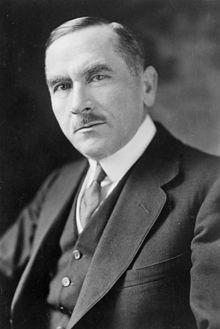This article needs additional citations for verification. (May 2009) |
National Democracy Narodowa Demokracja | |
|---|---|
| Leader | Roman Dmowski |
| Founded | 1886 |
| Ideology | Polish nationalism Civic nationalism[1] National conservatism[2] |
| Political position | Right-wing[3][4] |

| Part of a series on |
| Conservatism in Poland |
|---|
 |
National Democracy (Polish: Narodowa Demokracja, also known from its abbreviation ND as Endecja; [ɛn̪ˈd̪ɛt̪͡s̪jä]) was a Polish political movement active from the second half of the 19th century under the foreign partitions of the country until the end of the Second Polish Republic.[5] It ceased to exist after the German–Soviet invasion of Poland of 1939.
In its long history, National Democracy went through several stages of development.[5] Created with the intention of promoting the fight for Poland's sovereignty against the repressive imperial regimes, the movement acquired its right-wing nationalist character following the return to independence.[5] A founder and principal ideologue was Roman Dmowski. Other ideological fathers of the movement included Zygmunt Balicki and Jan Ludwik Popławski.[6]
The National Democracy's main stronghold was Greater Poland (western Poland), where much of the movement's early impetus derived from efforts to counter Imperial Germany's policy of Germanizing its Polish territorial holdings. Later, the ND's focus would shift to countering what it saw as Polish-Jewish economic competition with Catholic Poles. Party support was made up of the ethnically Polish intelligentsia, the urban lower-middle class, some elements of the greater middle class, and its extensive youth movement.
During the interbellum Second Republic, the ND was a strong proponent for the Polonization of the country's German minority and of other non-Polish (Belarusian, Lithuanian and Ukrainian) populations in Poland's eastern border regions (the Kresy). With the end of World War II and the occupation of the country by the Soviet Union and its communist puppet regime, the National Democracy movement effectively ceased to exist.
- ^ Cat-Mackiewicz, Stanisław (2012). Historia Polski od 11 listopada 1918 do 17 września 1939. Universitas. ISBN 97883-242-3740-1.
- ^ Bohler, Jochen (2019). Civil War in Central Europe, 1918–1921: The Reconstruction of Poland. Oxford University Press. p. 99.
- ^ Cite error: The named reference
Stachurawas invoked but never defined (see the help page). - ^ Cite error: The named reference
Between Nazis and Soviets: Occupation Politics in Poland, 1939-1947was invoked but never defined (see the help page). - ^ a b c Michał Szukała interview with Aleksander Hall (2014-08-05). "Dziedzictwo Narodowej Demokracji. W 150. rocznicę urodzin Romana Dmowskiego – rozmowa z Aleksandrem Hallem" (in Polish). 2013 © Muzeum Historii Polski (Museum of Poland's History). Retrieved 15 August 2014.
Podzielam pogląd Wiesława Chrzanowskiego, który był moim zdaniem najwybitniejszym kontynuatorem endecji, który uważał, że Narodowa Demokracja należy do przeszłości, ponieważ wypełniła z powodzeniem swoje najważniejsze zadanie polegające na stworzeniu nowoczesnego narodu obejmującego wszystkie warstwy społeczne. Podobnie jak swoje misje wypełniły kształtujące się w tej samej epoce ruch ludowy, czy patriotyczny nurt PPS nadający świadomość narodową warstwie robotniczej. — Aleksander Hall, dissident under communism, minister during Solidarity years, member of Parliament Sejm, recipient of the Order of the White Eagle (Poland).
- ^ Cite error: The named reference
davieswas invoked but never defined (see the help page).